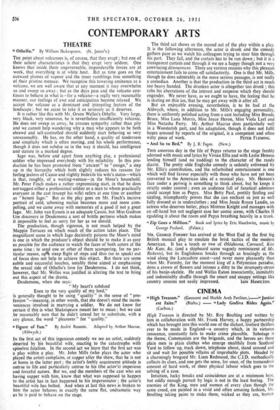CONTEMPORARY ARTS
THEATRE
14 Othello." By William Shakespeare. (St. James's.) THE point about volcanoes is, of course, that they erupt ; but one of their salient characteristics is that they erupt very seldom. One knows that inside them ungovernable, imponderable forces are at work, that everything is at white heat. But as time goes on the outward plumes of vapour and the inner rumblings lose something of their pristine menace. We recognise this towering eminence as a volcano, we are well aware that at any moment it may overwhelm us and sweep us away ; but as the days pass and the volcano con- tinues to behave in what is—for a volcano—a really very reasonable manner, our feelings of awe and anticipation become relaxed. We accept the volcano as a dominant and interesting feature of the landscape ; but we cease to take it as seriously as it deserves.
It is rather like this with Mr. Orson Welles's Othello. Very large, very black, very sonorous, he is nevertheless insufficiently volcanic. He does not sweep us away, he arouses sympathy rather than pity and we cannot help wondering why a man who appears to be both shrewd and self-controlled should suddenly start behaving so very unreasonably. He has, on the other hand, a quality of tenderness and simplicity which is often moving, and his whole performance, though it does not subdue us in the way it should, has intelligence and stature in a marked degree.
lago was, before and apart from anything else, a professional soldier who impressed everybody with his reliability. In this pro- duction he has been promoted from " ancient " to " ensign," a step up in the hierarchy which both slightly reduces his reasons for feeling jealous of Cassio and slightly.bedevils his wife's status—which is that, roughly, of a waiting-woman—in the Moor's household. Mr. Peter Finch makes a rather unpromising start, in that he does not 'suggest either a professional soldier or a man to whom practically everyone in the cast (except his wife) refers at one time or another as " honest Iago." But as the play goes on Mr. Finch's incisive portrait of cold, scheming malice becomes more and more com- pelling, and we came away with memories of a good if not a great lago. Mr. John van Eyssen is an adequate Cassio, but Miss Gudrun Ure discovers in Desdemona a sort of brittle pertness which makes it impossible to feel as sorry for her as we should.
The production, though vigorous, is not much helped by the Mappin Terraces on which much of the action takes place. The magnificent scene in which lago decisively poisons the Moor's mind is one in which the producer's object should be to make it as gasy as possible for the audience to watch the faces of both actors at the same time ; to send one or other of them scampering, for no par- ticular reason, up% steep flight of steps and thus (so to speak) out of focus does not help to achieve this object. But there are some subtle and successful touches, notably those aimed at emphasising the sexual side of Othello's love for Desdemona. I do not think, however, that Mr. Welles was justified in altering the text to bring out this aspect of the drama.
Desdemona, when she says: " My heart's subdued • Even to the very quality of my lord," is generally thought to be using "quality " in the sense of " pro- fession "—meaning, in other words, that she doesn't mind the incon- veniences involved in marrying a soldier. We do not know for certain if this is what Shakespeare meant her to mean ; but we can be reasonably sure that he didn't intend her to substitute, with a coy glance, the word " pleasures " for " quality."


































 Previous page
Previous page